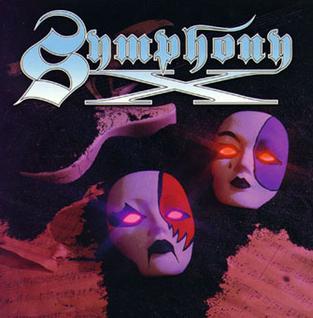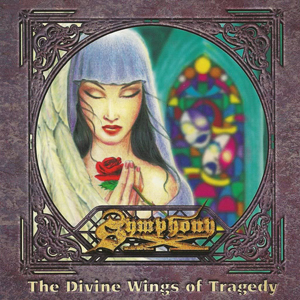The Divine Wings of Tragedy (1997)
1. Of Sins and Shadows - Here we go.
Here we fucking go. An absolute cracker of an opening track. Russell is on point and he sounds like an integrated part of the Symphony X machine. He doesn't need any help carrying the lyrics, but a handful of echoed lyrics are thrown in for fun and profit. Aggressive, strong riffage, and the drums no longer sound simply like double-bass only. Romeo's guitars have moved away from sounding like Malmsteen's clone and more into developing his own sound. Killer dueling guitar-keyboard solos. And the chorus soars, an apex of rapid, fierce progressive rock.
10/10.*
2. Sea of Lies - Little bass solo to start. It sounds a tiny bit muddy, but even listening to the special edition, I think there's some production going on here. Fun little keyboard work at the beginning, it hits that progressive necessity without advancing to wankery. The band is learning to be a bit tighter, and that's a great thing. Unique little chorus here, and it's really well done, and Russell is the clear standout: "Through eternal abyss I fall, silent screams through paper walls" are his best-sung lines to date. This song has a few timeshifts in it, but they no longer feel jarred or forced, they feel natural. Steve Harris knew how to do this stuff from day 1 (see Opera, Phantom of the); it took Symphony X 3 albums but they finally got it right. Great keyboard solo and a blistering lead. This one builds to a crescendo as well, but I don't think it quite hits the level of the previous track.
8/10.
3. Out of the Ashes - A little regression to older Symphony X here, the more carnival-esque sound that popped up in previous albums. It's better done than the previous two albums, but are better versions of lesser songs truly worth a huge increase in grade? I like it the more it goes on, and by directly comparing this to say, Masquerade from the original release, you can see the difference in quality, and it's not just Russell Allen making the difference. This is a band that has found itself and that feels the need to reach back into the past and try to right a historic wrong.
7.5/10.
4. The Accolade - Nice little riff to start, the keys playing something akin to the pipe sound near Troy Donockley's house. The synth gets a little too synthy during the intro at times, and we get some of that peak Yngwie-influenced Romeo over it. The instruments start to come in one by one, telling a fun story, though. About 2 minutes in a riff starts, and we finally get into the song proper. The difficult factor in this is making sure the song proper sounds like the intro, but they did such a good job layering parts of the eventual song into the intro that it works. Solos and time breaks apace. This is an aggressive progressive metal piece, designed to challenge the listener and either convince them that Symphony X is the band they want, or to force them to reject this style of music and go back to AC/DC and Kiss for hard rock simplicity. The break at 7:34, where bells ring in, we get what sounds like a lute? That would have made a song on the first two Symphony X albums sound ludicrous. Here, it's masterful and this band is only 3 years older than the first album. The song itself seems to be about a templar knight who sees himself as a reborn Sir Galahad, chasing the Holy Grail in the Holy Lands; and it strongly insinuates that the knight perishes for his belief. More of this, please.
10/10*
5. Pharaoh - This track is aggressively heavy, as if the band was afraid the previous track required a palate cleanser, but I'm afraid it ends up sounding a little too far from what we're looking for. It's not a bad song, not at all. It's just that the track, especially the stripped-down chorus, sounds more like a Jon Schaffer construct than a Symphony X one. The midpoint is a bit more SX-like, but then we go back to that heavier, uncomplicated sound (compared to other songs), especially the fast vocals right out of the instrumental. If you want a more straightforward rock track, this album's already given you a great one (Of Sins and Shadows). Still a fine track, but the weakest so far on the album.
7/10
6. The Eyes of Medusa - Zero breathing space between this and the previous track, which remains heavy but sounds more progressive out of the gate. After the intro riff, we get some tinkling keyboard lain over the song, a time change, and a more straight-forward riff. Russell sounds great when he launches into some haunting vocals to begin, rocking it up a bit as it goes. These two songs are reminding me really aggressively of
Horror Show. I like it about as much as I like the previous track. It's good without being great.
7/10.
7. The Witching Hour - The intro is a mess, and again, it sounds like the previous two albums. Russell is singing at an odd pitch here (is he trying to do a Rod Tyler impression? That's a bad idea), and the drums are back to the overly-simplistic sounds of the previous albums. This song is a failure in most ways. The chorus isn't great either. The midsection is passable at best, and they tie it up with more of the same boring stuff.
4/10.
8. The Divine Wings of Tragedy
I. At the Four Corners of the Earth - The intro gives me chills. Chant, more than song, setting up our premise. Lucifer, the angel, sings his regret to God at having to pick the path he does. He falls to temptation and loses his grace. We are being told that something massive is coming to our ears.
II. In the Room of Thrones - A martial theme, not unlike Mars - The Bringer of War by Gustav Holst (and, I suspect, intentionally so), a rising crescendo. War is coming, war for Earth between the fallen angel and his great rival. This breaks into a heavier riff, and eventually a gallop that would make Steve Harris proud. The best keyboard and guitar solos of the album so far that are the apex of this moment. Lucifer versus the other angels, his expulsion from Heaven.
III. A Gathering of Angels - The previous is followed by a quieter interlude that gains weight as it grows - not speed, not heavyness, but
weight, actual gravitas as we transfer to lyrics. Russell is beautiful as he launches into this lament-like verse, the regret of the fallen one.
IV. The Wrath Divine - A faster beat, the power growing of Lucifer as he descends. As he forms Hell, as he prepares his plot to divide humanity and force the end times, so that he might gain what he now considers his birthright. He will cross Jehovah, he will gain his purpose. Powerful.
V. The Prophet's Cry - The time has come. We get heavy beats, a rolling of drums that is like thunder, and then we hear a Nobuo-esque keyboard come in, the kind of sound that can only mean one thing - battle is dawning. Angels are forming ranks again; we can tell the moment of truth is getting nearer. These long instrumental breaks have never ceased being interesting, telling the story without lyrics. The lyrics are rockish, aggressive, hard, as the warrior-prince rises, his leader on Earth. Embodying the growing fire perfectly. Banish all kings from the face of the land! Perfect.
VI. Bringer of the Apocalypse - You really get the feeling during this that things are breaking. You can feel the almost divine-like sounds being interrupted and savaged by heavy, aggressive slams of guitar and keyboard, the intertwining of the two, the way the guitar solo seems to cry out in pain before the keyboards slam down over it, dueling back and forth. A really cool piece of music that, for the first time on this song, might go a little long, but not enough to bring down the overall grade. Riffs from earlier in the song make an appearance, most notably the rising crescendo from II. coming more and more notable with its own new crescendo that sounds like a Satanic march.,
VII. Paradise Regained - When the previous part eventually gives way, it is replaced by a far more utopic sound. Is this Heaven from above? Is this sound Hell making its place on Earth? The lyrics make it obvious - Satan is on earth, the Heaven above that he can never again reach, but now he has the one thing he always wanted, his paradise, a place where he can
choose.
This one goes to
11/10.*
9. Candlelight Fantasia - This one is a little cheesier, but it has some beautiful singing on it with lovely crescendos. I think I'd like it more if I wasn't mentally challenged by the previous track, though the chorus soars majestically. Not a big fan of the keyboard solo on this track, but it's a good enough ending track.
7.5/10.
Final score: 80%
* this song was added to my "Greatest Hits" playlist that stays on my phone at all time. A globally recognized mark of excellence.
The first great album from Symphony X,
Divine Wings of Tragedy nevertheless suffers from a dragging middle trio of songs that pull the grade down a bit lower than I was expecting, considering how much I enjoy the entire album. When I think about it, though, it's no coincidence; of the 1hr 5 minutes runtime, half of that is spent on two timeless classic songs from the band. They did throw in a little filler, but what's to be expected? Not many bands, especially in the mid 90s, put out an album like this. I can see why this one put the band on the progressive metal track and it makes me look forward to what comes next.





 The only song I don’t really care for is The Haunting.
The only song I don’t really care for is The Haunting.The only song I don’t really care for is The Haunting.


